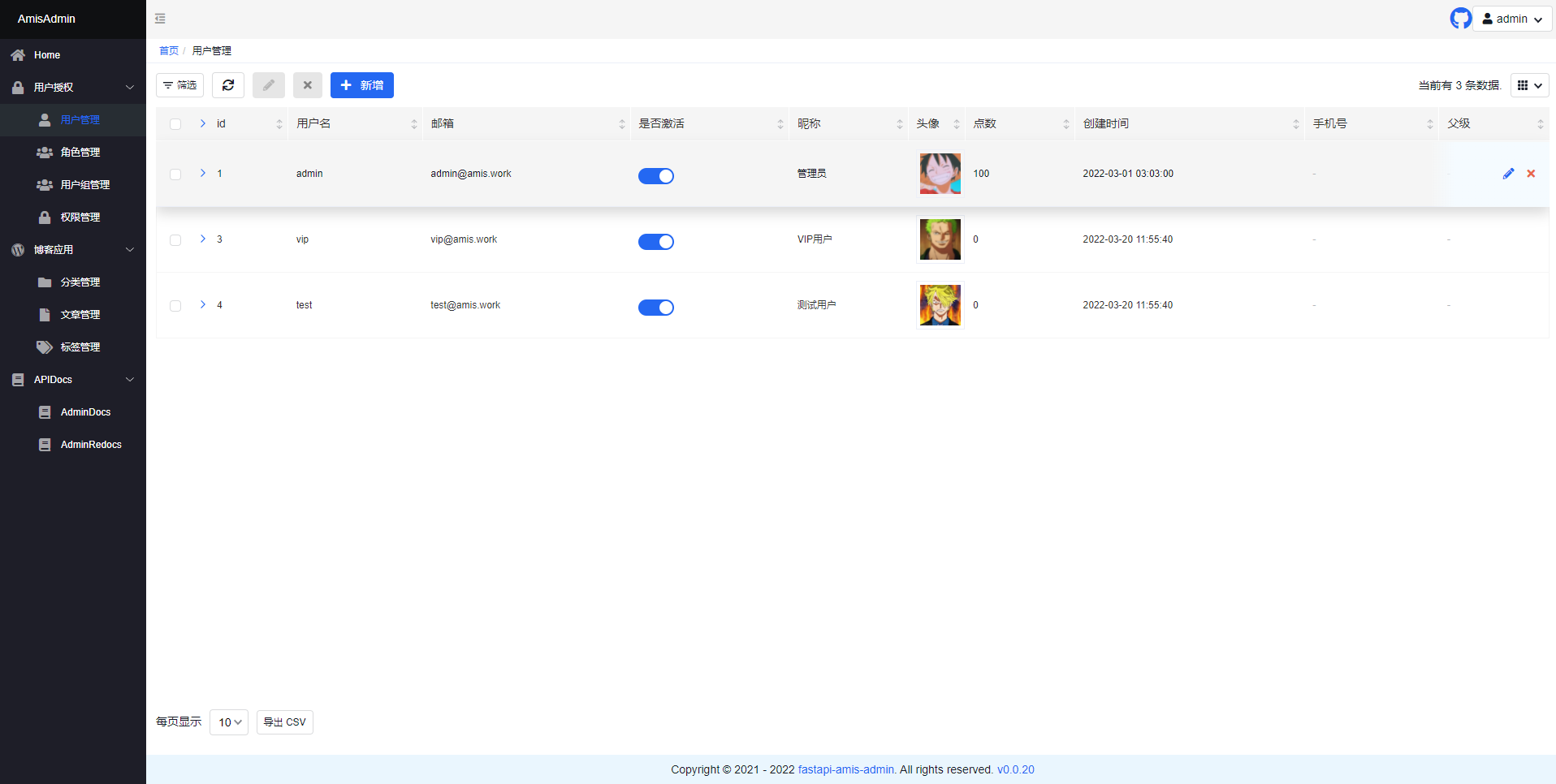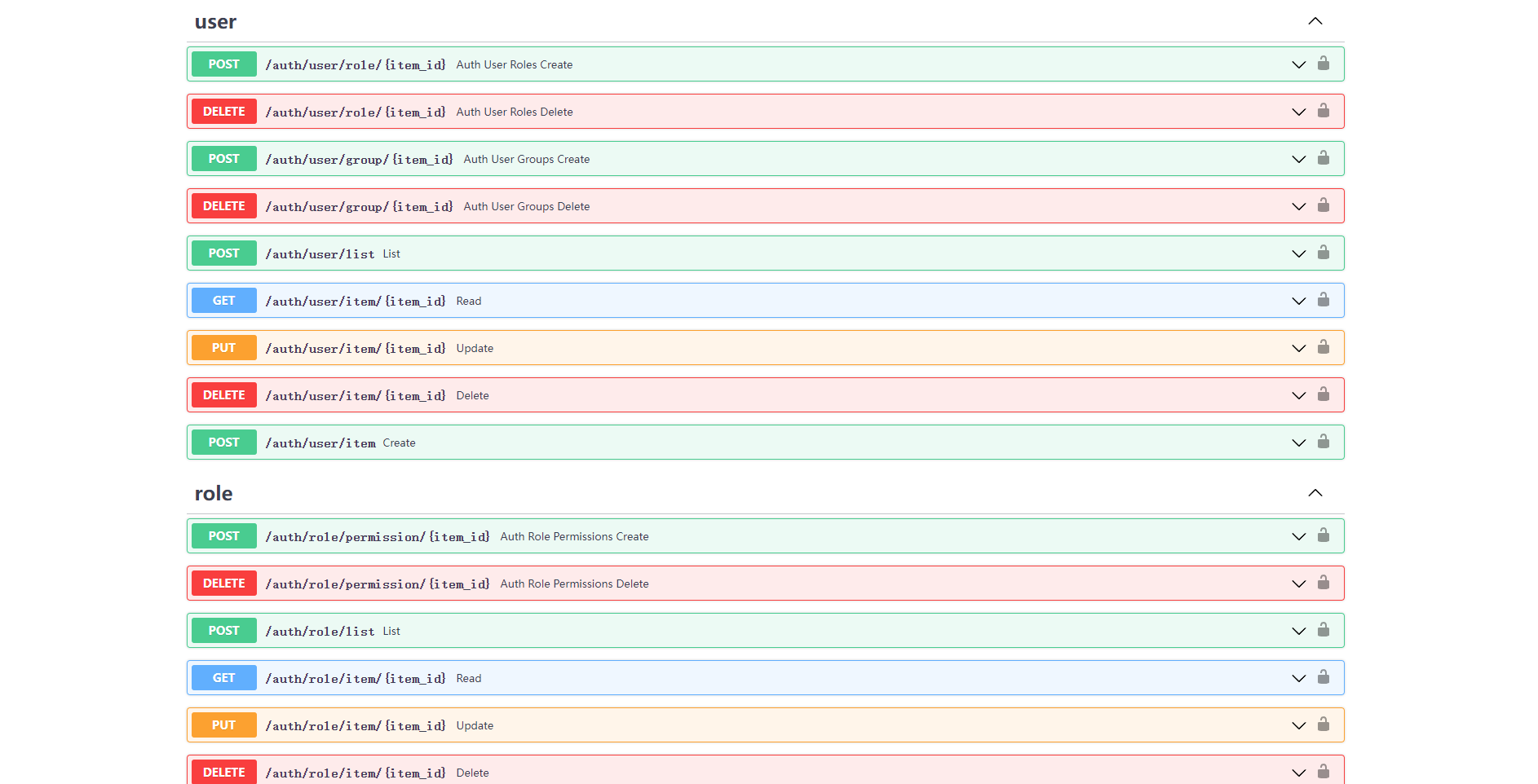fastapi-amis-admin is a high-performance, efficient and easily extensible FastAPI admin framework.
Inspired by Django-admin, and has as many powerful functions as Django-admin.
source code · online demo · documentation · can't open the document?
fastapi-amis-admin is a high-performance and efficient framework based on fastapi & amis with Python 3.7+, and
based on standard Python type hints. The original intention of the development is to improve the application ecology and
to quickly generate a visual dashboard for the web application . According to the Apache2.0 protocol, it is free and
open source . But in order to better operate and maintain this project in the long run, I very much hope to get
everyone's sponsorship and support.
- High performance: Based on FastAPI. Enjoy all the benefits.
- High efficiency: Perfect code type hints. Higher code reusability.
- Support asynchronous and synchronous hybrid writing:
ORMis based onSQLModel&Sqlalchemy. Freely customize database type. Support synchronous and asynchronous mode. Strong scalability. - Front-end separation: The front-end is rendered by
Amis, the back-end interface is automatically generated byfastapi-amis-admin. The interface is reusable. - Strong scalability: The background page supports
Amispages and ordinaryhtmlpages. Easily customize the interface freely. - Automatic api documentation: Automatically generate Interface documentation by
FastAPI. Easily debug and share interfaces.
- FastAPI: Finish the web part.
- SQLModel: Finish
ORMmodel mapping. Perfectly combine SQLAlchemy with Pydantic, and have all their features . - Amis: Finish admin page presentation.
fastapi-amis-admin consists of three core modules, of which, amis, crud can be used as separate
modules, admin is developed by the former.
amis: Based on thepydanticdata model building library ofbaidu amis. To generate/parse data rapidly.crud: Based onFastAPI&Sqlalchemy. To quickly build Create, Read, Update, Delete common API interface .admin: Inspired byDjango-Admin. Combineamiswithcrud. To quickly build Web Admin dashboard .
pip install fastapi_amis_admin- After version
fastapi-amis-admin>=0.6.0,sqlmodelis no longer a required dependency library. If you usesqlmodelto create a model, you can install it with the following command.
pip install fastapi_amis_admin[sqlmodel]from fastapi import FastAPI
from fastapi_amis_admin.admin.settings import Settings
from fastapi_amis_admin.admin.site import AdminSite
# create FastAPI application
app = FastAPI()
# create AdminSite instance
site = AdminSite(settings=Settings(database_url_async='sqlite+aiosqlite:///amisadmin.db'))
# mount AdminSite instance
site.mount_app(app)
if __name__ == '__main__':
import uvicorn
uvicorn.run(app)- Support
SQLModelmodel,SQLAlchemymodel,SQLAlchemy 2.0model - Method 1: Create model through
SQLModel.
from typing import Optional
from sqlmodel import SQLModel
from fastapi_amis_admin.models.fields import Field
class Base(SQLModel):
pass
# Create an SQLModel, see document for details: https://sqlmodel.tiangolo.com/
class Category(SQLModel, table=True):
id: Optional[int] = Field(default=None, primary_key=True, nullable=False)
name: str = Field(title='CategoryName', max_length=100, unique=True, index=True, nullable=False)
description: str = Field(default='', title='Description', max_length=255)- Method 2: Create model through
SQLAlchemy.
from sqlalchemy import Column, Integer, String
from sqlalchemy.ext.declarative import declarative_base
Base = declarative_base()
# Create an SQLAlchemy model, see document for details: https://docs.sqlalchemy.org/en/14/orm/tutorial.html
class Category(Base):
__tablename__ = 'category'
# Specify the Schema class corresponding to the model. It is recommended to specify it. If omitted, it can be automatically generated.
__pydantic_model__ = CategorySchema
id = Column(Integer, primary_key=True, nullable=False)
name = Column(String(100), unique=True, index=True, nullable=False)
description = Column(String(255), default='')- Method 3: Create model through
SQLAlchemy 2.0.
from sqlalchemy import String
from sqlalchemy.orm import DeclarativeBase, Mapped, mapped_column
class Base(DeclarativeBase):
pass
# Create an SQLAlchemy 2.0 model, see document for details: https://docs.sqlalchemy.org/en/20/orm/quickstart.html
class Category(Base):
__tablename__ = "category"
# Specify the Schema class corresponding to the model. It is recommended to specify it. If omitted, it can be automatically generated.
__pydantic_model__ = CategorySchema
id: Mapped[int] = mapped_column(primary_key=True, nullable=False)
name: Mapped[str] = mapped_column(String(100), unique=True, index=True, nullable=False)
description: Mapped[str] = mapped_column(String(255), default="")- If you create a model through
sqlalchemy, it is recommended to create a corresponding pydantic model at the same time, and setorm_mode=True.
from pydantic import BaseModel, Field
class CategorySchema(BaseModel):
id: Optional[int] = Field(default=None, primary_key=True, nullable=False)
name: str = Field(title="CategoryName")
description: str = Field(default="", title="CategoryDescription")
class Config:
orm_mode = Truefrom fastapi import FastAPI
from fastapi_amis_admin.admin.settings import Settings
from fastapi_amis_admin.admin.site import AdminSite
from fastapi_amis_admin.admin import admin
# create FastAPI application
app = FastAPI()
# create AdminSite instance
site = AdminSite(settings=Settings(database_url_async='sqlite+aiosqlite:///amisadmin.db'))
# register ModelAdmin
@site.register_admin
class CategoryAdmin(admin.ModelAdmin):
page_schema = 'Category'
# set model
model = Category
# mount AdminSite instance
site.mount_app(app)
# create initial database table
@app.on_event("startup")
async def startup():
await site.db.async_run_sync(Base.metadata.create_all, is_session=False)
if __name__ == '__main__':
import uvicorn
uvicorn.run(app)from typing import Any
from fastapi import FastAPI
from pydantic import BaseModel
from starlette.requests import Request
from fastapi_amis_admin.amis.components import Form
from fastapi_amis_admin.admin import admin
from fastapi_amis_admin.admin.settings import Settings
from fastapi_amis_admin.admin.site import AdminSite
from fastapi_amis_admin.crud.schema import BaseApiOut
from fastapi_amis_admin.models.fields import Field
# create FastAPI application
app = FastAPI()
# create AdminSite instance
site = AdminSite(settings=Settings(database_url_async='sqlite+aiosqlite:///amisadmin.db'))
# register FormAdmin
@site.register_admin
class UserLoginFormAdmin(admin.FormAdmin):
page_schema = 'UserLoginForm'
# set form information, optional
form = Form(title='This is a test login form', submitText='login')
# create form schema
class schema(BaseModel):
username: str = Field(..., title='username', min_length=3, max_length=30)
password: str = Field(..., title='password')
# handle form submission data
async def handle(self, request: Request, data: BaseModel, **kwargs) -> BaseApiOut[Any]:
if data.username == 'amisadmin' and data.password == 'amisadmin':
return BaseApiOut(msg='Login successfully!', data={'token': 'xxxxxx'})
return BaseApiOut(status=-1, msg='Incorrect username or password!')
# mount AdminSite instance
site.mount_app(app)
if __name__ == '__main__':
import uvicorn
uvicorn.run(app)# Install command line extension
pip install fastapi_amis_admin[cli]
# View help
faa --help
# Initialize a `FastAPI-Amis-Admin` project
faa new project_name --init
# Initialize a `FastAPI-Amis-Admin` application
faa new app_name
# Fast running project
faa run- Open
http://127.0.0.1:8000/admin/in your browser:
- Open
http://127.0.0.1:8000/admin/docsin your browser:
Amis-Admin-Theme-Editor:Theme-Editor for the fastapi-amis-admin. Allows to add custom css styles and to apply theme --vars change on the fly.FastAPI-User-Auth: A simple and powerfulFastAPIuserRBACauthentication and authorization library.FastAPI-Scheduler: A simple scheduled task managementFastAPIextension based onAPScheduler.FastAPI-Config: A visual dynamic configuration management extension package based onFastAPI-Amis-Admin.FastAPI-Amis-Admin-Demo: An exampleFastAPI-Amis-Adminapplication.FastAPI-User-Auth-Demo: An exampleFastAPI-User-Authapplication.
- According to the
Apache2.0protocol,fastapi-amis-adminis free and open source. It can be used for commercial for free, but please clearly display copyright information aboutFastAPI-Amis-Adminon the display interface.


